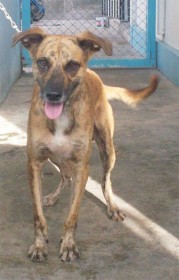Let’s continue our discussion on the dietary requirement of the older dog. Last week, we spoke of the need for protein (high quality) and easily digestible carbohydrates and a little fat.
Let me commence by giving you a sample maintenance diet: 50 per cent corn meal porridge together with 50 per cent commercial puppy ration. You may add a vitamin/mineral supplement.
If the dog needs to lose weight, give him a quarter less than the maintenance diet above.
Generally, speaking, the diet would also need vitamins and minerals, especially if you are not feeding specially formulated commercial rations for the older dog.
You remember I said (Pet Corner, September 19) that the function of the kidneys in the elderly dog is more often than not the first to be compromised. Well, this reduced kidney function often results in loss of B-vitamins in the urine.

Moreover, some minerals and vitamins are not optimally absorbed through the intestines of the old dog. They are defecated out in the stool, and must be replaced. You can use any of the many pet vitamins/minerals products on the market – following veterinary advice, of course.
Some general dietary considerations
– Instead of feeding the old dog only once daily, it may be of value to divide his daily requirements into two or three feeds.
– If the dog has a specific organ ailment or is already too obese, let your vet prescribe a specific diet for your pet.
– Do not feed the old dog cold food.
– Do not change his diet. Whatever is the routine, stick to it – as long as there are no obvious deleterious consequences. The digestive tract of the elderly dog has specific bacteria which have ‘evolved’ to deal with a specific diet. A sudden change (even in the water quality) can create a diarrhoea and other gastro-intestinal upsets. If you have to change his diet, do it gradually.
Some final comments pertaining to the care of the old dog:
All sorts of interventions can be made to extend the life of an elderly dog, or to make his last months/years more tolerable. One smart text advocated moderation in all things as the great basis for the care of the elderly dog. Changes should be by evolution and not by revolution.
I should mention that my own experience (which is not original) has shown that the introduction of a new puppy to the household does wonders for the rejuvenation of the old dog. I want to believe that this observation is the same for humans. Just don’t show the young puppy more love and attention and care. Seniority has its privileges. Besides, you do not want to create jealousy or the feeling of abandonment in the older dog.
Please implement disease preventative measures (vaccinations, routine dewormings, monthly anti-heartworm medication, etc) and adopt-a-pet from the GSPCA’s Animal Clinic and Shelter at Robb Street and Orange Walk, if you have the wherewithal to care well for the animals. Do not stray your unwanted pets, take them to the GSPCA’s Clinic and Shelter instead. If you do not wish your pet to have puppies or kittens, you may exploit the GSPCA’s free spay and neutering programme. If you see anyone being cruel to an animal, or if you need any technical information, please get in touch with the Clinic and Shelter by calling 226-4237.









